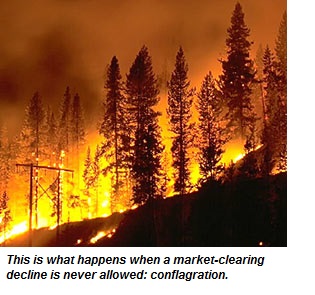Strip an economy of capital, productive incentives, talent and yes, ethics, and what are we left with? An economy spiraling toward an inevitable collapse.
Financialization is destroying the real economy, but few in power seem to notice or care. The reason why is painfully obvious: those in power are reaping vast fortunes from the engines of financialization–for example, former President Obama: Obama Goes From White House to Wall Street in Less Than One Year.
This is not to single out President Obama as a special case; politicos across the spectrum depend on the engines of financialization to fund their campaigns and make them multi-millionaires, and corporate managers and financiers have skimmed billions of dollars in gains not from producing new, better and more affordable goods and services but by playing financialization games such as borrowing billions to buy back stocks, leveraged buyouts, and so on–all of which have reaped the insiders gargantuan fortunes while hollowing out the real economy.
Financialization necessarily hollows out the real economy, as Gordon Long and I detail in this new video program: The Results of Financialization – Part I (34 minutes)
The key dynamic is that financialization creates irresistible incentives to ramp up debt and leverage at the expense of the real economy. Those who fail to exploit financialization will underperform the market and be fired.
As Gordon explains, if a CEO refuses to load a company up with debt, a private-equity financier with access to cheap Federal Reserve credit will scoop up the company in a private buyout, fire the management, extract immense profits by loading the company with debt, then take the hollowed-out shell public again, reaping another windfall of financialized gains.
Note that the private-equity financiers have every incentive to lay off employees, especially experienced workers who earn higher salaries, to reduce costs before they take the hollowed-out shell public.
How can corporations pay out more to shareholders than they actually earned? Easy–financialization.
Another key dynamic in financialization is limitless liquidity and super low interest rates set by central banks–rates that are so low and liquidity so abundant that corporations can roll over their debt and actually add more debt and keep their interest payments unchanged.
This dynamic inevitably leads to zombie corporations–corporations with low rates of growth and profitability and high debt loads that in an unfinancialized economy would be recognized as insolvent and liquidated.
As we explain, financialization skews the risk-reward in favor of financial games, so real-world investments no longer make sense. Why risk building a factory in the U.S. or training workers when the pay-off is uncertain, when there are so many ways to reap immense fortunes via financial games that are ultimately backstopped by the Federal Reserve or federal agencies (i.e. the taxpayers)?
As many observers have noted, these perverse incentives have siphoned human talent away from productive employment and into enormously well-compensated but parasitic, exploitative financialization-related jobs.

Strip an economy of capital, productive incentives, talent and yes, ethics, and what are we left with? An economy spiraling toward an inevitable collapse. The metaphor I’ve used to explain this in the past is the Yellowstone forest fire. The deadwood of bad debt, extreme leverage, zombie companies and all the other fallen branches of financialization pile up, but the central banks no longer allow any creative destruction of unpayable debt and mis-allocated capital; every brush fire is instantly suppressed with more stimulus, more liquidity and lower interest rates.
As a result, the deadwood sapping the real economy of productivity and innovation is allowed to pile higher.
The only possible output of this suppression is an economy piled high with explosive risk. Eventually Nature supplies a lightning strike, and the resulting conflagration consumes the entire economy.
- The Yellowstone Analogy and The Crisis of Neoliberal Capitalism (May 18, 2009)
- The Financial Markets Now Control Everything (April 29, 2015)
I explain all this in greater detail in my short book Why Our Status Quo Failed and Is Beyond Reform.
If you found value in this content, please join me in seeking solutions by becoming a $1/month patron of my work via patreon.com.
Check out both of my new books, Inequality and the Collapse of Privilege($3.95 Kindle, $8.95 print) and Why Our Status Quo Failed and Is Beyond Reform($3.95 Kindle, $8.95 print, $5.95 audiobook) For more, please visit the OTM essentials website.
NOTE: Contributions/subscriptions are acknowledged in the order received. Your name and email remain confidential and will not be given to any other individual, company or agency.


I thought this was an excellent discussion. Charles and Gordon accurately describe what is going on with corporations and stocks. My one criticism might be their contention “you can’t pay out more than you’re taking in forever”. On the surface this seems true. In reality our monetary system is based on it. We must continually create debt or the system will crash, and nobody in charge will let that happen. Sure, maybe at some point some event or natural disaster will prevent this “kicking the can down the road” but I don’t see this happening any time soon. And most people, especially the sociopaths in charge, will always kick the can the can down the road until the day they die. The rich will always design a system which benefits them and pay politicians to pass laws and enforce them. There is really nothing the 99.9% can do about it.